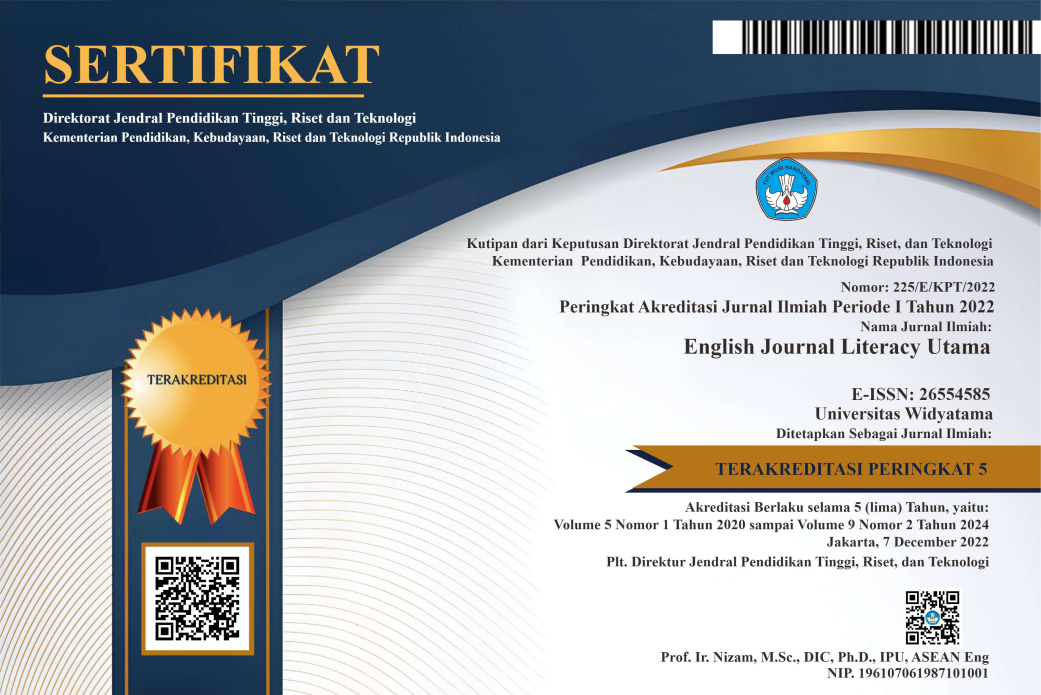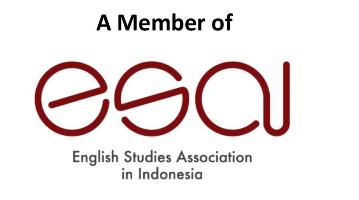HUMOROUS DISCOURSE ON THE MIDDLE EAST: ATTITUDE TOWARDS REPRESENTATION
DOI:
https://doi.org/10.33197/ejlutama.v8i1.230Keywords:
Stand-Up Comedy, Representation, AttitudeAbstract
Western perspective dominantly sees the Middle East in negative stereotypes. Many ways from many backgrounds start to criticize this perspective, including comedians utilizing comedy narration. This research aims at discovering how comedian represents Middle East and how the response manifests commenter’s attitude, applying descriptive qualitative research as a logical consequence that the data are in forms of stand-up performance transcription uploaded to YouTube and its sample comments from its comment column. Process of identifying Middle East representation and commenter’s attitude respectively utilizes Halliday’s transitivity and Martin & White’s appraisal system narrowed to attitude subsystem. The research results conclusions as follow. First, in terms of representation, the comedy narration provides an alternative platform to positively represent the Middle East, while second, commenter’s responses in attitude perspective mostly support the positive representation by showing their positive affection within themselves, favorable judgment in entity perspective, and affirmative appreciation to the happening event. This research attempt to see stimulated attitude after a representation in a specific social issue appears, while other researches documented in this writing integrate both theories at the same hierarchy. The relation varies in perspective of the audience stimulated by the discourse and who affirmatively experienced the discourse. At this point, comedy may have potency as a platform to pleasantly criticize sensitive issues
References
Alfin, J., Zuhri, A. M., Rosyidi, Z., & Stelmachowska, D. M. (2018). Wacana Islamophobia Dan Persepsi Terhadap Islam Indonesia Melalui Studi Bahasa Di Kalangan Mahasiswa Polandia. MIQOT, 42(1), 207–2019.
Antoine, K. (2016). “Pushing the Edge” of Race and Gender Hegemonies through Stand-up Comedy: Performing Slavery as Anti-racist Critique. Etnofoor, 28(1), 35–54.
Attardo, S. (2001). Humorous Texts: A Semantic and Pragmatic Analysis. Berlin: Mouton de Gruyter.
Bagchi, A., & Paul, J. A. (2018). Youth unemployment and terrorism in the MENAP (Middle East, North Africa, Afghanistan, and Pakistan) region. Socio-Economic Planning Sciences, 64, 9–20.
Brodie, I. (2008). Stand-up Comedy as a Genre of Intimacy. Ethnologies, 30(2), 153–180.
Creswell, John W.; Creswell, J. D. (2018). Research Design; Qualitative, Quantitative, and Mixed Methods Approaches (Fifth ed). Los Angeles, London, New Delhi, Singapore, Washington DC, Melbourne: SAGE Publications, Inc.
Culcasi, K. (2010). CONSTRUCTING AND NATURALIZING THE MIDDLE EAST. Geographical Review, 100(4), 583–597.
D’Urso, G., & Symonds, J. (2021). Teacher Attitudes Towards the Representation of Homosexuality in Film and Television: A New Self?report Questionnaire. Sexuality & Culture, 25, pages1726–1741.
Ediyono, S., Istadiyantha, Farhah, E., Malik, A., & Jazuli, A. (2020). The Study of Socio-Cultural Changes in the Middle Eastern Community’s Thoughts. ICCoLLiC.
Espírito, A., & Santo. (2015). Citizens’ attitudes towards descriptive representation: The case of women in Portugal. Reprints and Permissions, 23(1), 43–59.
Fairclough, N. (2013). Language and Power (2nd ed). London, New York: Routledge.
Faoziah, M. F., & Yuwono, U. (2020). The appraisal system in greenpeace food campaigns. Pertanika Journal of Social Sciences and Humanities, 28(4), 3089–3108.
Goetze, J. (2020). Investigating Foreign Language Teacher Anxiety Using SFL’s ATTITUDE and TRANSITIVITY Systems. Journal for the Psychology of Language Learning, 2(1), 36–45.
Grossman, R., Campo, M. S., Feitosa, J., & Salas, E. (2021). Cross-cultural perspectives on collaboration: Differences between the Middle East and the United States. Journal of Business Research, 129, 2–13. https://doi.org/10.1016/J.JBUSRES.2021.02.031
Halliday, M. A. K. (1994). An Introduction to Functional Grammar (2nd ed). London: Edward Arnold.
Halliday, M. A. K. (2014). Halliday’s Introduction to Functional Grammar (4th ed). London, New York: Routledge.
Heriyono, H. (2020). Optimizing UAM Corpus for Tranisitivy Process Regarding to Cvod-19 News in Indonesia from February to March 2020. English Journal Literacy UTama, 5(1), 325–333. Retrieved from https://ejl.widyatama.ac.id/index.php/ejlutama/article/view/127/127
Ignatieva, N. (2019). A Functional Analysis Of Transitivity And Attitude Systems Interacting In Student Texts In Spanish. International Journal of Systemic Functional Linguistics, 2(1), 14–23.
Issawi, C. (1973). Oil and Middle East Politics. Proceedings of the Academy of Political Science, 31(2), 111–122.
Jones, R. H., Chik, A., & Hafner, C. A. (2015). Introduction, Discourse analysis and digital practices. In R. H. Jones, A. Chik, & C. A. Hafner (Eds.), Discourse and Digital Practices, Doing Discourses Analysis in the Digital Age (p. 1). London, New York: Routledge.
Jones, T. C. (2012). America, Oil, and War in the Middle East. The Journal of American History, 99(1), 208–218.
Kelemen, B., & Fergnani, A. (2020). The futures of terrorism against China in the Greater Middle East. Futures, 124, 1–11.
Ladki, S., Abimanyu, A., & Kesserwan, L. (2020). The Rise of a New Tourism Dawn in the Middle East. Journal of Service Science and Management, 13, 637–648.
Lutz, B. J., & Lutz, J. M. (2015). Globalisation and Terrorism in the Middle East. Terrorism Research Initiative, 9(5), 27–46.
Martin, J. R., & White, P. R. R. (2005). The Language of Evaluation, Appraisal in English. Hampshire, New York: Palgrave Macmillan.
Mintz, L. E. (1985). Standup Comedy as Social and Cultural Mediation. American Quarterly, 37(1), 71–80.
Moleong, L. J. (2011). Metodologi Penelitian Kualitatif (Edisi Revi). Bandung: PT Remaja Rosdakarya.
Müller, C., & Strube, M. (2006). Multi-Level Annotation of Linguistic Data with MMAX2. In S. Braun, K. Kohn, & J. Mukherjee (Eds.), orpus Technology and Language Pedagogy. New Resources, New Tools, New Method (pp. 197–214). Frankfurt: Peter Lang.
Pérez, R. (2013). Learning to make racism funny in the “color-blind” era: Stand-up comedy students, performance strategies, and the (re)production of racist jokes in public. Reprints and Permissions, 24(2), 478–503.
Pratama, F. N. (2021). Strageti Publikasi Kinerja Joko Widodo dan Respons Warganet pada Media Sosial Twitter: Kajian Appraisal. Bandung: Universitas Pendidikan Indonesia.
Qasim, Muhammad, H., Sibtain, Masroor, Nawaz, & Shafqat, M. (2020). An Appraisal-Transitivity Analysis of Editorials on the Results of General Elections -2018 in Pakistan. Journal of Research in Social Sciences, 8(2), 95–115.
Rezaei, N., Huang, W.-J., & Hung, K. (2023). Tourist’s achievement emotions and memorable experience in visiting the Middle East. Tourism Management Perspectives, 47(101129).
Ridder, A. De, Vandebosc, P. D. H., & Dhoest, P. D. A. (2021). Examining the hedonic and eudaimonic entertainment experiences of the combination of stand-up comedy and human-interest. Poetics, 90(1), 1–11.
Siswati, E. (2019). Women’s attitude towards representation of women domestication in advertisement. Masyarakat, Kebudayaan Dan Politik, 32(1), 80–94.
Sørli, M. E., Gleditsch, N. P., & Strand, H. (2005). Why Is There so Much Conflict in the Middle East? The Journal of Conflict Resolution, 49(1), 141–165.
Sugiyono. (2007). Metode Penelitian Kuantitatif Kualitatif dan R&D. Bandung: Alfabeta.
Thomas, J. M. (2015). Laugh through it: Assembling difference in an American stand-up comedy club. Reprints and Permissions, 16(2), 166–186.
Tin, D., Fares, S., Mulhim, M. Al, & Ciottone, G. R. (2022). Terrorist Attacks in the Middle East: A Counter-Terrorism Medicine Analysis. Prehospital and Disaster Medicine, 37(2), 212–216.
van Dijk, T. A. (2003). The Discourse-Knowledge Interface. In G. Weiss & R. Wodak (Eds.), Critical Discourse Analysis, Theory and Interdiscioplinarity (pp. 85–109). Hampshire, New York: Palgrave Macmillan.
Wüster, T. (2006). Comedy Jokes: Steve Martin and the Limits of Stand-Up Comedy. Studies in American Humor, 3(14), 23–45.
Downloads
Published
Issue
Section
License
Copyright (c) 2023 Fauzan Novaldy, Dinda Noor Azizah

This work is licensed under a Creative Commons Attribution-NonCommercial-ShareAlike 4.0 International License.
Creative Commons Attribution-ShareAlike 4.0 International License















